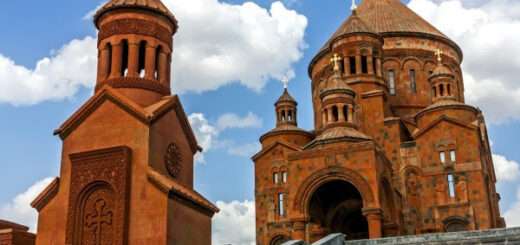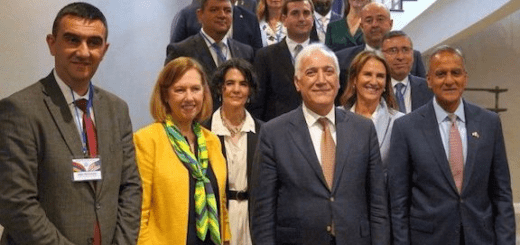A foreign war is shaping the race to replace Cong. Adam Schiff

By MELANIE MASON
Politico
LOS ANGELES — The race to replace Rep. Adam Schiff in the House has played out against the backdrop of a volatile overseas conflict that exploded into violence last fall, sparking ongoing backlash from crucial voters against the Biden administration.
But the crisis roiling this Los Angeles-area district is not the war in Gaza. It’s the fever-pitch tension between Armenia and Azerbaijan.
The decades-long dispute hit a bloody crescendo last September, when Azerbaijan abruptly seized control of Nagorno-Karabakh, a separatist territory that had been occupied for decades by ethnic Armenians. The lightning attack in the region, which Armenians call Artsakh, led to hundreds of deaths and more than 100,000 Armenians displaced.
To Armenian Americans, it was an ethnic cleansing that got little response from the United States, leaving the community feeling deeply betrayed and abandoned by the Biden White House.
Those sentiments are especially acute in Schiff’s former district, which has the highest concentration of Armenian American residents in the country. But this local race also serves as a broader bellwether for Armenian Americans in pivotal swing states such as Michigan and Nevada where tens of thousands of voters could end up having an outsized impact on the presidential race.
In Michigan, some Armenian American voters joined the movement to cast an “uncommitted” vote, an effort spearheaded by Arab Americans to protest Biden’s position on Gaza. The campaign won more than 100,000 votes — or 13 percent of the vote — in Tuesday’s primary.
“I can’t enthusiastically tell people you need to vote for Biden because he has always been with us,” said Ardy Kassakhian, a city council member in Glendale, the de facto capital of the Armenian diaspora in the United States. Even as the president officially recognized the Armenian genocide of 1915, fulfilling a campaign promise, he also “turned a blind eye” to human rights abuses by Azerbaijan, Kasshakian said — a stark contrast to Biden’s vocal support for Ukraine and Israel in its respective conflicts.
“Armenian Americans just kind of look at that and say, ‘Why are we any less than our Ukrainian brothers or our Jewish brothers and sisters?’” he continued. “Why was Armenia kind of left out on its own?”
Schiff’s Senate run leaves this deep-blue seat vacant for the first time in more than two decades, attracting a swarm of candidates hoping to succeed him. Local politicians have long had a standard formula for courting the Armenian community, which makes up 13 percent of registered voters: recognizing the 1915 genocide, visiting Armenia and wooing the vast network of grassroots clubs, churches, television channels and cultural groups that have made the community a political powerhouse.
But the fallout from the recent clashes have added a new, tricky balancing act to the playbook. Democrats are loath to do anything that would undercut their party’s leader during a high-stakes presidential year, but to channel the Armenian American community’s frustrations, nine of the Democratic contenders have pressured Biden to act more assertively. They’ve called for increased aid to Armenia, an end to military assistance to Azerbaijan and a stronger diplomatic role in the region.
“Our community expects candidates to not only forcefully condemn Azerbaijan’s actions, but hold the Biden Administration to task for its ongoing refusal to impose consequences on Azerbaijan for its genocidal aggression against the Armenians of Artsakh,” said Alexander Galitsky, program director of the Armenian National Committee of America (ANCA).
In 2000, Schiff beat incumbent GOP Rep. James Rogan, one of the House managers of the impeachment of President Bill Clinton, in a conservative-tilting purple district. The expensive battle hinged on fierce competition for the Armenian vote.
Twenty four years later, Schiff has parlayed his own turn as House impeachment manager of President Donald Trump into a Senate bid. The seat he occupies is no longer a toss-up; Democrats hold a 38-point registration advantage in a district that dips into the LGBTQ+ enclave of West Hollywood, the hipster hub of Los Feliz and Hollywood’s Thai Town.
In a sense, the district serves as a microcosm of American multicultural democracy, with various ethnic, racial and identity groups all influencing the candidates who hope to win their votes.
The rare vacancy in a safe Democratic district attracted a horde of hopefuls, all following Schiff’s blueprint of wooing the Armenian American community. The voting bloc is seen as sophisticated and politically-engaged, so investments in Armenian canvassers and bilingual mailers can offer meaningful return.
According to Political Data Inc., a campaign data firm, Armenian American voters account for nearly 20 percent of the ballots returned so far in the congressional district, though overall turnout there — as it is throughout the state — has been abysmal.
The two Democrats that get the most mention are Assemblymember Laura Friedman and state Sen. Anthony Portantino, who each currently represent the area in the state Legislature. Friedman lives in Glendale, where Armenian American residents make up as much as 40 percent of the population, and got her start in local government there. Portantino has also made community outreach a focal point and even received a papal medal from the Supreme Patriarch of the Armenian Church, the first non-Armenian in the Western diocese to get such an honor.
Kassakhian, a Portantino backer, said the state senator was the first and only American official to go to the disputed region since a 2020 war there significantly escalated the conflict.
“He doesn’t take this Armenian community for granted,” said Kassakhian, who unsuccessfully ran against Friedman in a pitched legislative race in 2016. “There’s authenticity and a genuine desire to do what’s right for Armenians.”
Manuel Magpapian, president of the Southern California Armenian Democrats, credits Friedman with being the best partner on issues that matter to the community domestically, as well as abroad.
“The thing that sets her apart in my view is that Laura Friedman works on Armenian issues as she sees them in California,” Magpapian said. “And in California, we’re not different than any other group. We care about housing costs. We care about affordability, the cost of living.”
While some key community groups have weighed in, such as the Southern California Armenian Democrats for Friedman and the western regional arm of the ANCA, which backs Portantino, others have stayed on the sidelines, including the ANCA’s national arm.
The political dynamics between local groups is a “very, very complex” brew of ideology, personalities and ties to parties in Armenia, said Mike Feuer, a third Democrat in the race.
Feuer, who has served as a state legislator, Los Angeles City Council member and city attorney, touts his own ties to the community, back to his days doing legal aid work.
“None of us can claim that we have a lock on the Armenian vote,” Feuer said. “All of us [have to] earn that support, and that’s a verb I choose on purpose.”
Other Democrats in the race, including Los Angeles Unified School District board member Nick Melvoin, West Hollywood City Councilmember Sepi Shyne and G. “Maebe A. Girl” Pudlo, a progressive trans activist who ran against Schiff in 2022, have also incorporated Armenian outreach into their campaigns.
Another Democrat seems tailor-made to appeal to the district: Jirair Ratevosian, a former State Department official and public health advocate. Ratevosian is gay, Armenian American and grew up in the area, and he has argued that it takes an Armenian to truly put the community’s issues at the forefront.
“I released a five-point plan on how to enhance U.S.-Armenian relations. I haven’t seen that from the other candidates,” Ratevosian said. “The other candidates go to Armenian events and they throw out a few Armenian words and try to gain support.”
But Ratevosian has not been endorsed by any major groups, such as the ANCA. Armenians in the district say that Ratevosian, who has spent much of his career working in Washington, is a promising but unknown quantity, compared to the longstanding relationships they’ve cultivated with elected officials.
Ratevosian has made the twin crises in Nagorno-Karabakh and Gaza pillars of his campaign — drawing connections between the two conflicts and being the first candidate in the race to call for a cease-fire.
“You can’t represent the Armenian interests if you are not pro-cease-fire right now,” he said. “As Armenians, we know what it’s like to lose your homeland, what wholesale population displacement looks like. I very much associate myself with the challenge that Palestinians are experiencing now.”
Ratevosian says he hears about the Israeli-Palestinian conflict constantly as he knocks on doors in the district. Other candidates say the issue has come up far less often in conversations with voters.
A second Armenian American candidate is on the ballot carrying the Republican banner: physician Alex Balekian. The GOP has historically had key ties to the community; President Ronald Reagan acknowledged the Armenian genocide — the last president to do so before Biden’s official recognition — and former California Gov. George Deukmejian was the son of Armenian immigrants. Older Armenian voters tend to skew more conservative. Still, Armenian Americans typically vote Democratic.
Balekian, who calls himself a “Deukmejian Republican,” has won notoriety for his involvement in the so-called parents’ rights movement in Glendale which has protested certain LGBTQ+ curriculum in public schools.
But after Azerbaijan’s Sept. 19 attack, Balekian called for “brief, targeted US military intervention” and told Armenian American voters they needed to rethink their loyalties to Democrats like Schiff.
“Armenians need to see they got themselves into this mess by supporting a con-man like Adam Schiff,” he said in a campaign video.
Magpapian, president of the Southern California Armenian Democrats, said he’s noticed a distinct souring among Democrats about Biden, indicating they may choose to leave the presidential race empty on their ballots.
“They don’t like Trump … and while Biden has done some good things for Armenians, it hasn’t been enough,” Magpapian said.
The top Democrats running for the seat, however, say they believe Armenian American voters’ disappointment is directed more broadly at the international community, not solely Biden.
“There’s a real feeling of a deep unease of the world allowing a humanitarian crisis to unfold in that region,” Friedman said. “Tens of thousands of refugees having to literally walk out of Artsakh and leave their possessions behind.”
All of the major candidates said they called on the White House for more concrete action after the September attack. Portantino and Friedman signed onto a letter urging Biden to “make every effort to send aid, relief, and peacekeeping.” Feuer said the attack offered an opportunity for the United States to play a more muscular role in the region.
Portantino said supporting Biden’s presidential run and pressing him for a more robust response to the Armenian-Azeri dispute are “not mutually exclusive.”
“Just because I’m a Democrat and supportive of Biden doesn’t mean I have to agree with every single thing that the U.S. administration does all the time,” Portantino said. “And in this case, the U.S. should do significantly more.”







